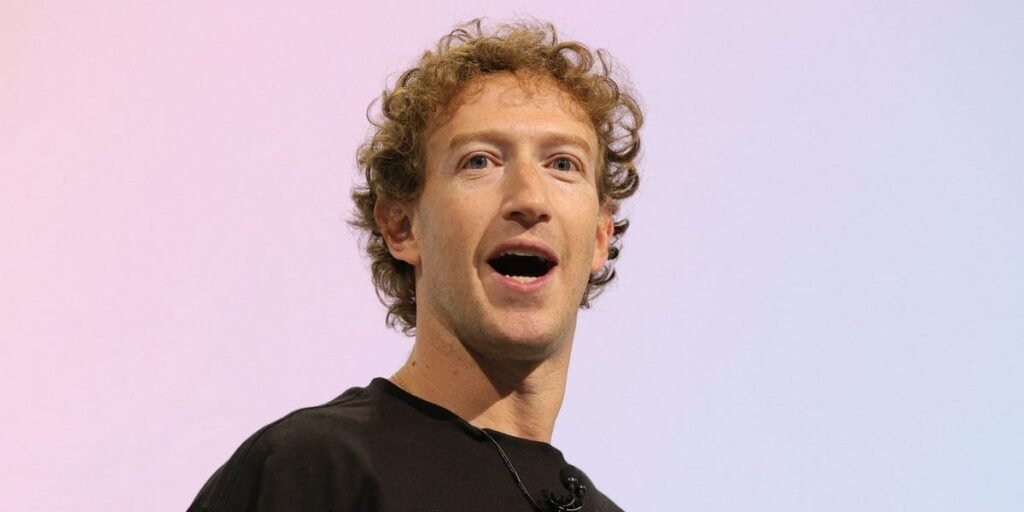subscribers. Become an Insider
and start reading now.
Have an account? .
- Facebook’s cultural relevance has been on the rocks for years.
- Emails between Mark Zuckerberg and a Facebook exec reveal Meta’s concerns about the social network.
- The emails were used as evidence in the FTC’s antitrust lawsuit against Meta.
Mark Zuckerberg has been worried about Facebook’s cultural relevance for years.
Emails from April 2022 between Zuckerberg and Tom Alison — Meta’s head of Facebook — were presented in court this week during the FTC’s antitrust trial against Meta.
The main topic of the email exchange: How to keep Facebook relevant.
“Even though the FB app’s engagement is steady in many places, it feels like its cultural relevance is decreasing quickly and I worry that this may be a leading indicator of future health issues,” Zuckerberg wrote.
He added that even if Instagram and WhatsApp did well, he didn’t see a path to success for Meta if Facebook faltered.
Just months before these emails, Facebook had widely rolled out reels, its short-form video product resembling TikTok. While Zuckerberg said in the emails that he agreed with Facebook’s recent shift of resources to reels, he wanted to “make sure we have a unique vision” for the Facebook app.
So, what was going wrong on Facebook, then?
According to the emails, here’s what was affecting Facebook’s cultural relevance at the time:
- Facebook’s classic act of “friending” someone seemed to have lost its luster. “First, a lot of people’s friend graphs are stale and not filled with the people they want to hear from or connect with,” Zuckerberg wrote, adding that the act of friending someone also felt too “heavyweight” for users. “Do you want to be seen as someone adding friends on FB, or would you rather be seen adding the person on IG?” In the same exchange, Zuckerberg presented three options to Alison that could help Facebook’s relevancy, including one “crazy idea” of wiping people’s friend graphs and having them start from scratch.
- People were turning to other platforms, like Instagram, to follow friends and public figures. Zuckerberg himself even admitted that he was more likely to follow surfers or MMA fighters on Instagram or Twitter. “Every other modern social network is built on following rather than friending, so it seems possible that the FB app is just outdated because it never adopted this fundamental innovation,” Zuckerberg said.
- Facebook’s attempt to focus on communities with groups still needed work. “I’m optimistic about community messaging, but after running at groups in FB for several years, I’m not sure how much further we’ll be able to push this,” Zuckerberg wrote. “It’s possible groups will just never be as big as friending/following, and that a lot of group behavior is moving to messaging anyway.”
- Its push into short-form video needed to feel more social, and also unique to Facebook. Zuckerberg said that while Facebook’s push of reels was good for surfacing interesting content in the feed, “it reduces the social sense of feeling connected to the person creating the content,” especially if it wasn’t made on Facebook. Alison responded to Zuckerberg in one email that the “problem with Facebook is that we don’t have a culturally relevant public content ecosystem as a baseline since it’s mainly comprised of commoditized news and video publisher content.”
- Facebook has a litany of competitors — even its own sibling, Instagram. TikTok, YouTube, Twitter, and Reddit all came up in the exchange. Smaller social apps were also referenced, like friend-sharing apps BeReal and Poparazzi. But one of the most interesting competitors was Instagram, especially since its acquisition by Facebook is core to the FTC’s case against Meta. (It appears that Instagram’s top exec, Adam Mosseri, was cc’d on these emails.) “Differentiating between IG and FB is important, but I think we need to find a strategy that doesn’t leave one service picking up the scraps the other service leaves behind or having either service artificially or unreasonably constrain itself,” Zuckerberg wrote. “Right now IG is doing well on cultural relevance and FB isn’t, so I’m more focused on figuring out a reasonable path for FB longer term.” Nothing like a little sibling rivalry.
Read the full article here


